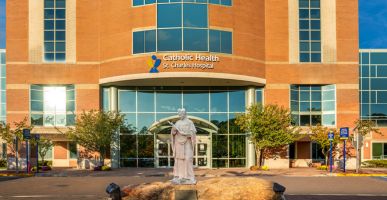Personalized Care for Parkinson's Disease
Catholic Health's dedicated Movement Disorders Specialty Care Center offers comprehensive services for Parkinson's disease, beginning at diagnosis, that encompasses multidisciplinary approaches for treatment. This approach to clinical excellence and compassionate care gives you the best access to quality of life with innovative therapies and treatments as well as education and support to help you and your loved ones cope with Parkinson’s Disease.
Our Parkinson’s Disease Specialty Care Center at St. Charles Hospital (Port Jefferson, NY) offers specialized care for adults diagnosed with Parkinson's disease. We also offer support to patients at our Parkinson’s Disease Information and Referral Centers at both St. Charles Hospital and St. Catherine of Siena Hospital (located at Catholic Health Ambulatory Care in Commack, NY). Our referral centers are approved by the American Parkinson Disease Association (APDA).
St. Charles Hospital is honored to be recognized as an American Parkinson Disease Association (APDA) Information & Referral Center.
Thanks to the support from APDA, an APDA Information & Referral (I&R) Coordinator is dedicated to supporting the local Parkinson’s disease (PD) community through the creation of educational and support programs, by providing advice and connections to the necessary local health care experts, disseminating reliable Parkinson's disease resources, and much more.
Having an APDA I&R Coordinator at St. Charles allows us to offer specialized care and supportive services to those facing a Parkinson's disease diagnosis, thereby helping everyone impacted by PD live life to the fullest.
Our APDA I&R Coordinator Julie Garofalo, RN can be reached at 631-862-3560 and julie.garofalo@chsli.org
You can find more information about Parkinson’s disease, resources, and events on the
APDA website www.apdaparkinson.org
Parkinson's Disease Symptoms, Treatment & Management
Parkinson’s disease is a slowly progressive, neurodegenerative disorder. While there are validated clinical criteria for making a clinical diagnosis of Parkinson’s disease, there is no single clinical test for diagnosing the disorder nor any known cure. The disease develops differently for each patient. Early detection plays a key role in developing a customized treatment plan to suppress symptoms and improve function.
Contact your doctor to schedule a neurological and physical exam if you think you are experiencing symptoms.
Parkinson’s disease is a slowly progressive, neurodegenerative disorder that impacts a person's function and ability to perform daily activities.
Most people, on average, develop the symptoms of Parkinson’s disease between ages 55-60. Early onset Parkinson's disease is defined when someone is diagnosed under 50 years old.
Parkinson’s disease symptoms fall into two major categories: motor and non-motor. The motor symptoms of stiffness (rigidity) and slowness (bradykinesia) define “parkinsonism"—a person who looks like they could have Parkinson’s disease.
While rest tremor is common, not everyone diagnosed has a tremor. The symptoms are typically slowly progressive and generally affect one side greater than the other.
The four primary motor symptoms include:
- Bradykinesia (slow movement)
- Postural instability
- Rigidity (tightness or stiffness of the limbs or torso)
- Tremors
- Depression and anxiety
- Disturbances in the sense of smell
- Dystonia (involuntary and repetitive muscle movements causing the body to twist or assume a particular posture)
- Fatigue
- Gastrointestinal issues (including constipation, difficulty swallowing)
- Lightheadedness
- Pain
- Personality changes
- Psychosis (hallucinations and delusions)
- Sleep problems
- Sweating
- Urinary issues
- Vision issues
- Vocal symptoms
- Walking or gait difficulties
- Weight loss
Parkinson’s disease is distinctive from other movement disorders because cell loss occurs in a very specific region of the brain. The nerve cells, or neurons, produce dopamine that helps regulate movement. Most Parkinson’s disease treatments work to increase the level of dopamine and help you regain movement.
Because Parkinson's disease is a progressive movement disorder, our care team works closely with you to modify your customized disease management plan as needed.
Parkinson's disease symptoms can be managed with:
- Medication
- Physical rehabilitation
- Lifestyle modifications like diet, exercise and sleep
- Extensive supportive services for patients and their caregivers
- Provide access to clinical trials
- Provide access to explore surgical options including Deep Brain Stimulation
Catholic Health's movement disorders team help you with the physical and emotional challenges of Parkinson's disease.
- Board-Certified Neurologists and fellowship trained movement disorder specialist—provide a thorough clinical evaluation of your medical history, mental health, laboratory testing, pulmonary function testing, urinalysis and more
- Board-Certified Neuropsychologists—perform neuropsychological testing, cognitive assessments and counseling
- Board-Certified Physiatrists—specialists in physical medicine and rehabilitation who evaluate your movements
- Certified occupational, physical and speech therapists
- Social workers
Comprehensive Services
The Parkinson’s Disease Specialty Care Center at St. Charles Hospital (Port Jefferson, NY) provides personalized treatment for adults diagnosed with Parkinson's disease. Your disease management plan includes customized physical therapy, occupational therapy and speech therapy to help you overcome physical and verbal challenges that interfere with everyday tasks like holding a conversation, walking, dressing, cooking and using a phone. Access can often be close to home with our satellite therapy centers throughout Long Island.
As Long Island's leader in rehabilitation services, St. Charles Hospital gives you access to the highest level of rehabilitative care and the latest and most innovative treatments. St. Charles Hospital is also a designated Information and Resource Center by the American Parkinson Disease Association (APDA).
Early intervention is critical for Parkinson's disease treatment. Our rehabilitation experts at St. Charles Hospital are committed to discussing, developing and implementing a comprehensive plan that provides you with comfort, convenience and quality of life.
Therapies include the BIG and LSVT LOUD techniques. Patients following BIG techniques perform specific exercises with exaggerated movement patterns, which can be applied to daily activities like reaching for objects, ascending stairs and opening doors. Patients using the principles of LOUD increase the volume of their speech to help improve their breathing, voice box and articulation, all of which are essential for making their speech easily understood by others.
Our physiatrists, who specialize in physical medicine and rehabilitation, evaluate movement and treat gait and balance issues through therapeutic intervention and customized orthotics or braces.
The Sleep Disorders Center at St. Charles Hospital is a full-service sleep disorders center staffed with board-certified specialists who help Parkinson's patients find relief from sleep problems commonly associated with the disease.
The American Parkinson Disease Association (APDA) provides support groups in partnership with St. Charles Hospital and St. Catherine of Siena Hospital and have extended these services to other locations in Suffolk County.These groups provide educational and emotional support to our patients with Parkinson's disease and their families. The APDA Information and Referral Center also can refer you to exercise programs and connect you with resources and information in your community.
Our Parkinson’s Disease Information and Referral Centers are located at St. Charles Hospital and Catholic Health Ambulatory Care at Commack.
The APDA Information and Referral Center offers:
- Support groups for the general population of Parkinson’s disease patients
- Young onset support groups
- Care-partner support groups
- Deep Brain Simulation support groups
- Support group educational series for those diagnosed five years or less
- Loud & Lyrical Vocal Group run by a neurologic music therapist
- Virtual trivia and other game sessions
- Educational events
- Walkathons
- Up-to-date information on medical and surgical treatments for Parkinson’s disease
- Educational booklets on numerous aspects of Parkinson’s disease and its management
- Physician referrals
- Referrals and information related to clinical trials
- Referrals and information related to community resources

Catholic Health Ambulatory Care at Commack
Commack, NY

St. Charles Hospital
Port Jefferson, NY

